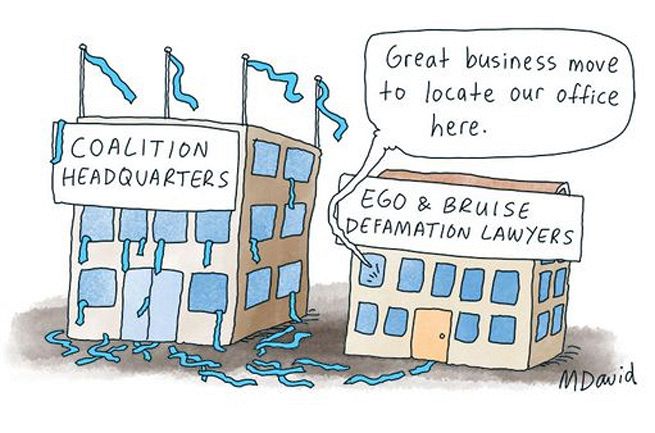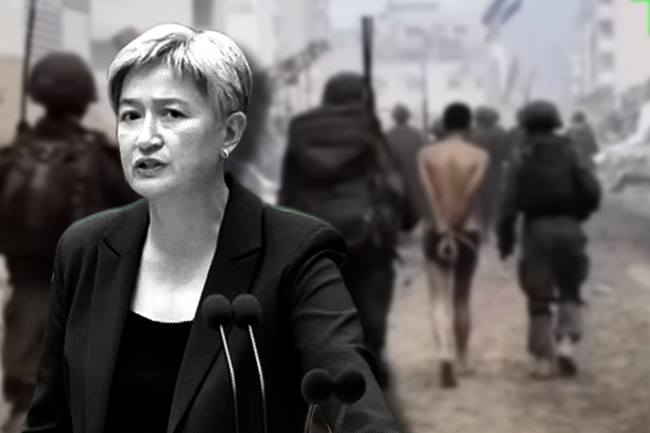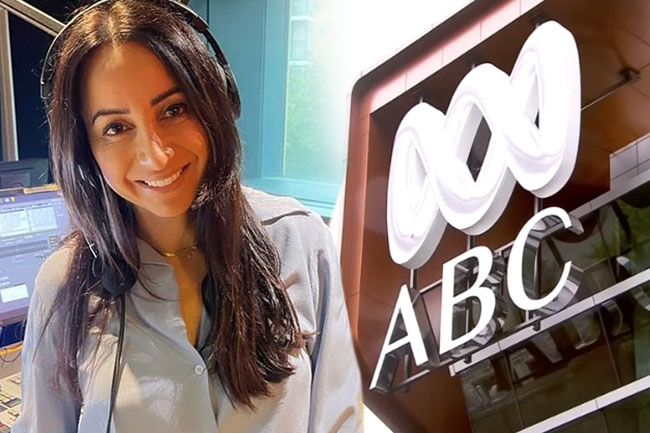Conservative political figures and journalists have been trying to silence critics on social media while spewing Liberal Party propaganda, writes Dr Jennifer Wilson.
RELATIONS BETWEEN some journalists and the Twitter Australian political demographic – #auspol – have rumbled along in a tone of chronic low-level antagonism for quite some time now. Like hostile dogs on either side of a fence, both parties erupt periodically in a savage barking contest when the mutual aggravation becomes overwhelming, backing off temporarily when events external to the feud demand attention. However, lately, there’s been an accelerated move to muzzle Auspol, one that demands a closer look.
In the last weeks, Professor Peter van Onselen, Professor of Journalism at the University of Western Australia and sometime political opinionista for Sky News, Channel 10 and the ABC, has, along with two notorious alleged sexual harassers, MPs Christian Porter and Andrew Laming, instructed lawyer Rebekah Giles to send concern notices and demands for costs to academic and Twitter user Professor Gemma Carey.
This prelude to defamation litigation is to do with comments Carey posted on the social media platform that apparently grievously offended the three men. The details of the story can be read here and here.
Next, Auspol followers were provoked by a series of blatantly sycophantic tweets published by Nine News associate producer Gillian Lantouris, showing video of Prime Minister Scott Morrison in Melbourne rolling gnocchi dough, getting a haircut and eating spring rolls.
These cunning stunts are obviously the beginning of Morrison’s election campaign, material he doesn’t have to pay for until that campaign is announced and generously provided for him by one of the Liberal Party’s several propaganda arms, overseen by ex-Liberal Treasurer, Peter Costello.
Tweeps quite rightly made their contempt for this unsubtle drivel (accompanied by aggravatingly juvenile commentary) known to Ms Lantouris. Reasoned and appropriate criticism of the Lantouris effort was then posted by former federal politician, Cheryl Kernot. Bizarrely, Kernot’s accurate observations were then described by ABC senior political journalist Andrew Probyn as ‘bullying’, which, he advised us, isn’t nice.
Auspol reacted strongly to legitimate criticism of a journalist being framed as “bullying” and Probyn was, as we call it on the platform, “ratioed” for his trouble.
All of this might sound trivial in the scheme of things, however, let’s look a little deeper. As noted earlier, van Onselen is a Professor of Journalism, a profession disproportionally affected by Australia’s draconian defamation laws and yet, this action is the Professor’s default. He didn’t contact Carey and ask her to remove the post. He went straight to threats of litigation, apparently in concert with two notorious Liberal politicians, forming an axis of righteousness that is in itself remarkable, given its origins.
As many journalists never tire of pointing out, Australian Twitter is a small platform with a small readership. One wonders why they are compelled to make so much fuss about it, if this is the case. Carey’s tweet went largely unremarked, until van Onselen instigated legal proceedings. The story has now been covered by Independent Australia the Daily Mail UK, Crikey and is ongoing on Twitter.
This result what is known as the Streisand Effect, when taking defamation action causes the defendant to become even more exposed than they were before.
Of course, this might have been the Professor’s intention.
Defamation threats not only intimidate the recipient but everyone else on social media. They have a chilling effect on speech and that is what they are designed to do.
Van Onselen, Porter and Laming are, by accident or design, part of a conservative push to control the expression of public opinion on social media platforms. This push includes Morrison’s repeated threats to compel platforms to compel users to identify themselves. Anonymous donors to the legal fees of MPs are acceptable to the PM; anonymous social media accounts, not so much.
Andrew Probyn may not care to see himself as part of this conservative push, but that he is echoing the zeitgeist is unarguable. Criticism of journalists is not the same as bullying them, as has been most ably argued in this publication by Dr Martin Hirst. While there is no doubt that some journalists – particularly women – are disgustingly treated on social media, this fact is too often used to obscure legitimate criticism which has now become conflated in language with bullying to an Orwellian degree, as demonstrated by Probyn’s ludicrous accusation. Criticism is weaponised and those who dare to do it are shamed as “bullies”.
While it would be daft to suggest a conspiracy involving three male litigants and Probyn, there is no doubt that all four echo, in their own way, the Morrison Government’s ongoing efforts to stifle criticism, dissent and opinion.
That powerful men default to disproportionate defamation threats when their feelings are hurt is not just the over-reaction of overly sensitive self-regarding egos. It is a message sent to all of us on social media: offend me, and I will crush you.
Van Onselen particularly made this unhinged desire to grind into the ground clear when he tweeted:
‘I won’t let this rest ever.’
Probyn’s wilful misunderstanding of the serious nature of bullying and his appropriation of the term as a weapon is likewise the use of a sledgehammer to intimidate and quash legitimate criticism of what, in anybody’s book, is an appalling failure of journalism. The stated purpose of the Fourth Estate is to speak truth to power, not to collapse in a froth of adolescent fandom over power getting its hair cut and fingering the gnocchi dough. Quite why a senior political journalist felt compelled to defend this slavering tribute to the Prime Liar remains disconcertingly unexplained.
Dr Jennifer Wilson is an IA columnist, a psychotherapist and an academic. You can follow Jennifer on Twitter @NoPlaceForSheep.
Related Articles
- 5 Easy steps to join the world of Twitter (Part 2)
- 5 Good reasons to join the world of Twitter (Part 1)
 This work is licensed under a Creative Commons Attribution-NonCommercial-NoDerivs 3.0 Australia License
This work is licensed under a Creative Commons Attribution-NonCommercial-NoDerivs 3.0 Australia License
Support independent journalism Subscribe to IA.














